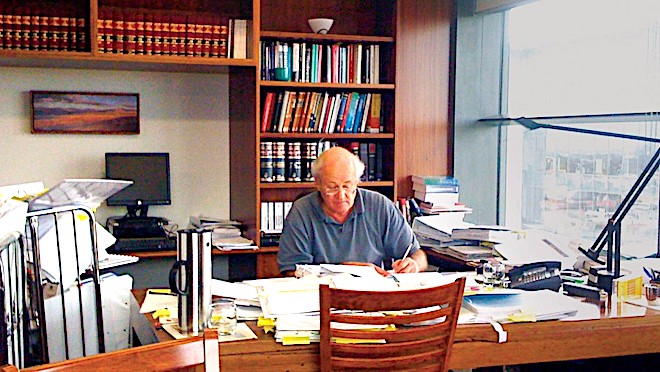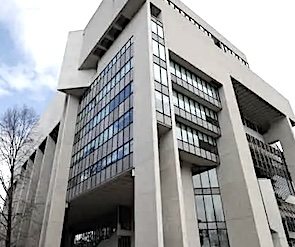Finn's finale
 Obit •
Obit •  Friday, October 6, 2023
Friday, October 6, 2023 Paul Finn ... Former federal judge and serious academic ... 1946-2023 ... Equitable duties and good government ... The outsider who should have gone to the High Court ... Lunching connections ... The history of crony capitalism ... From the Obituaries Editor
 Finn at the ANU: taught and mentored a generation of leading lights
Finn at the ANU: taught and mentored a generation of leading lights
The Honourable Paul Desmond Finn joined us on April 22, 1946, and left us, the poorer for his passing, on September 27, 2023 after a short fight with dementia.
Paul was born in Brisbane to a lawyer father, who soon died, leaving Paul to grow up with a step-father who was also a lawyer, although Paul later claimed that he was under no pressure to go into law, but ended there through a lack of imagination.
But, as it turned out, not any lack of ability, or wider insight.
He went through UQ Law School in the 1960s in what must have been an interesting period, marked by its usual intransigent reactionary qualities, contrasted against the occasional outsider, such as Dr V.G. (George) Venturini.
George, after escaping the smoking ruin of the Trade Practices Commission as reconfigured by John Howard as Fraser's Minister for Consumer Affairs in 1976, happily reflected on his time teaching a class at UQ which contained the young Paul along with Michael Crommelin and (the later Sir) Ross Cranston.
Paul headed to London for a Masters supervised by Peter Birks, and then to Cambridge where he took a PhD and won the Yorke Prize (other laureates include Kiwi and transnational judge Robin Cooke, Yale academic and Torrens Title afficionado John Langbein and historian Sir John Baker).
The prize was for his dissertation, which Paul later turned into his first book, Fiduciary Obligations in 1976 (republished with additional materials in 2016).
Later in life, covered in honours, he returned to Cambridge to take the Goodhart Chair for 2010-11, Sir Anthony Mason being his only Australian predecessor in that role.
English attempts to duchess Paul proved utterly unfruitful: he grew progressively more Anglophobic with the passing years, both as to culture and common law as worked out in England.
What pleasure for him in retirement to have seen a seven bench of the UK Supreme Court in FHR European Ventures LLP v Cedar Capital Partners LLC quote him approvingly from a judgment in his last year on the Federal Court, Grimaldi v Chameleon Mining - thus steering English law back into unity with the rest of the common law world.
That first book marked the deep and brooding core value in the Finn personal and legal life, but his second book was to the side, involving extensive research, Law and Government in Colonial Australia in 1987.
This slender but dense volume in fact only deals with NSW, Victoria and Queensland. It serves to explain the curious "colonial communism" of the second half of the nineteenth century (and indeed up to the privatisation mania of the 1990s) in this country, but the failure of the academy to provide a successor to Paul in writing the history of the other colonies is shameful.
Paul returned from Cambridge in 1975 to teach at UQ, but the remainder of his working life was divided equally between his time at ANU (1977 to 1995) and as a Federal Court judge (1995 to 2012).
At ANU he was head of Law in the Research School of Social Sciences, beloved as a firm taskmaster of his graduate students, and mentor to many undergraduates, including Stephen Gageler, now Chief Justice in waiting.
Paul's competitive spirit was given rein in his fitness regime of running, which left some colleagues wilting.
The gig at ANU gave him the opportunity to organise annual seminars on diverse legal topics, tables surrounded by a mix of academics and legal practitioners, mostly senior barristers and judges.
From these ventures eight volumes of essays emerged, still relevant. Practical insights were on view in the Finn contribution to the WA Inc Royal Commission Report of 1992, which allowed him to vent his concern for good government, explaining how the problems of crony capitalism that had turned up in the West so spectacularly had been dealt with elsewhere in the western world.
In 1995 Paul made the transition, unusual in common law jurisdictions, of trading the title of professor for that of judge. He sat initially in Canberra, where he had a chance to deal with case law at the heart of government.
He didn't miss his opportunities, and in Hughes Aircraft Systems International v Airservices Australia he laid down the law on government tendering in Australia, along the way delivering a text book analysis which mirrored his work in the WA Inc Commission on government accountability in a system of responsible government.
From the lonely isolation of Federal Court life in Canberra, Finn moved to the small but collegial registry in Adelaide, but of course life on the Federal Court had him moving about the country: you never knew where you might end up lunching with him.
One of the cases of which he was proudest from late in his judicial career was Akiba v Queensland (No 3), determining that native title recognised commercial activity as part of indigenous culture pre-European settlement.
Overturned by a Full Federal Court, his judgment was roundly reinstated by the High Court.
Amid all the work of judging there were lunches, where he managed to be discreet but whimsical about lawyers and colleagues. He did think that a significant portion of the profession in Adelaide didn't even know the Federal Court existed.
Only once did I see a shadow pass over the Finn equanimity, and that followed his receipt from old classmate Ross Cranston in London of news that upon his being commissioned to the High Court bench, he was now Sir Ross.
Australian republicanism was stamped on Finn's face in that moment.
Still, that didn't stop Sir Ross turning up for a day in Paul's honour in 2016 at ANU for papers to be delivered by old students (by then judges) and his classmates, and attended by former colleagues and retired High Court Justices Sir Anthony Mason and Bill Gummow with whom Paul had long friendships.
These were turned into a Festschrift by Tim Bonyhady of ANU Law as Finn's Law: An Australian Justice, published by Federation Press in 2016.
Paul's first marriage to Mary, also a judge, finished, and he married Suzanne Corcoran, an American academic and legal historian. From his first marriage he was proud of his daughter and son.
The real legal passion at the heart of the Finn enterprise was not mere dry equitable concern for the law of trustees, but in particular how that law might be applied to the public arena to encourage good government.
Thus, he opened an essay, "The Forgotten Trust: The People and the State" in Cope's collection Equity with a quote from the Pennsylvania Declaration of Rights, 1776:
"All power being ... derived from the people: therefore all officers of government, whether legislative or executive, are their trustees or servants, and at all times accountable to them."
Again and again Finn returned to this theme of trustee standards falling on governments, but it marked him as not quite sound to the powerful.
John Toohey may have made those noises in Mabo, but the British Empire wasn't built by legal restraints on government. As universal suffrage took hold, it was so much easier to blame the electorate for not electing governments that behaved in accordance with equitable principles of good faith to those over whom they wielded power.
Typically, Australia denied itself the services of Finn at the highest judicial level. Despite the delivery of powerful and ground-breaking judgments and publication of many useful articles, he was categorised as an academic, and writing about equity's standards being applied to government behaviour only emphasised his place as an outsider.
To Sir Owen Dixon's list of those who surprisingly didn't get to the High Court (e.g. Sir Leo Cussen and Sir Frederick Jordan) may be added Paul Finn.
A great lawyer and companion, sadly missed.










Reader Comments